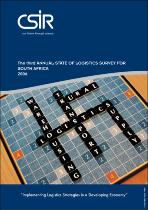JavaScript is disabled for your browser. Some features of this site may not work without it.
- ResearchSpace
- →
- Research Publications/Outputs
- →
- Conference Publications
- →
- View Item
| dc.contributor.author |
Ittmann, HW

|
|
| dc.contributor.author |
Havenga, JH

|
|
| dc.contributor.author |
Naude, AH

|
|
| dc.contributor.author |
Botes, FJ

|
|
| dc.contributor.author |
Jacobs, CG

|
|
| dc.contributor.author |
Pienaar, WJ

|
|
| dc.contributor.author |
Schoeman, C

|
|
| dc.contributor.author |
King, D

|
|
| dc.contributor.author |
Ralehoko, E

|
|
| dc.contributor.author |
Meyer, IA

|
|
| dc.contributor.author |
Marais, Mario A

|
|
| dc.contributor.author |
Hobbs, IE

|
|
| dc.date.accessioned | 2007-08-16T11:55:00Z | |
| dc.date.available | 2007-08-16T11:55:00Z | |
| dc.date.issued | 2007 | |
| dc.identifier.citation | Ittmann, HW et al. 2007. Implementing logistics strategies in a developing economy. 3rd Annual State of Logistics survey for South Africa, 2006, pp 34 | en |
| dc.identifier.isbn | 978-0-7988-5567-9 | |
| dc.identifier.uri | http://hdl.handle.net/10204/1139 | |
| dc.description.abstract | Logistics was identified by the South African government in the Accelerated and Shared-Growth Initiative of South Africa (ASGISA) as one of the six potential hurdles that may limit future growth in the country. Strategies were put in place to address this potential treat. The National Freight Logistics Strategy and the National Land Transport Strategic Framework are two such strategies, supported by strategies in many other spheres of government to ensure that the country increases its competitiveness. Currently these strategies are being implemented within the developing economy with varying degrees of success. The theme of this survey, “Implementing logistics strategies in a developing economy”, is therefore highly appropriate. Implementation is critical but doing it properly and thoroughly with a long-term view does not happen overnight. Proper foundations need to be laid to ensure sustainable growth as well as increased competitiveness through world-class supply chains. It is only through such endeavours that South Africa will be able to operate and compete in the global market place. In addition, those within the second economy who require focused assistance, specifically from a logistics and supply chain management point of view, cannot be ignored. The CSIR (Council for Scientific and Industrial Research) and its associates believe that critical aspects are addressed in the third State of Logistics report. The report is similar in format to the first two surveys and allows for trend analysis, which is vital to keep track of what is happening in this critical area. | en |
| dc.language.iso | en | en |
| dc.subject | Macro-economic perspective | en |
| dc.subject | Industry perspective | en |
| dc.subject | Small business development | en |
| dc.subject | Modelling approach | en |
| dc.subject | Macro freight logistics | en |
| dc.subject | Second economy | en |
| dc.subject | Government service delivery | en |
| dc.subject | Future perspective | en |
| dc.title | Implementing logistics strategies in a developing economy | en |
| dc.type | Conference Presentation | en |
| dc.identifier.apacitation | Ittmann, H., Havenga, J., Naude, A., Botes, F., Jacobs, C., Pienaar, W., ... Hobbs, I. (2007). Implementing logistics strategies in a developing economy. http://hdl.handle.net/10204/1139 | en_ZA |
| dc.identifier.chicagocitation | Ittmann, HW, JH Havenga, AH Naude, FJ Botes, CG Jacobs, WJ Pienaar, C Schoeman, et al. "Implementing logistics strategies in a developing economy." (2007): http://hdl.handle.net/10204/1139 | en_ZA |
| dc.identifier.vancouvercitation | Ittmann H, Havenga J, Naude A, Botes F, Jacobs C, Pienaar W, et al, Implementing logistics strategies in a developing economy; 2007. http://hdl.handle.net/10204/1139 . | en_ZA |
| dc.identifier.ris | TY - Conference Presentation AU - Ittmann, HW AU - Havenga, JH AU - Naude, AH AU - Botes, FJ AU - Jacobs, CG AU - Pienaar, WJ AU - Schoeman, C AU - King, D AU - Ralehoko, E AU - Meyer, IA AU - Marais, Mario A AU - Hobbs, IE AB - Logistics was identified by the South African government in the Accelerated and Shared-Growth Initiative of South Africa (ASGISA) as one of the six potential hurdles that may limit future growth in the country. Strategies were put in place to address this potential treat. The National Freight Logistics Strategy and the National Land Transport Strategic Framework are two such strategies, supported by strategies in many other spheres of government to ensure that the country increases its competitiveness. Currently these strategies are being implemented within the developing economy with varying degrees of success. The theme of this survey, “Implementing logistics strategies in a developing economy”, is therefore highly appropriate. Implementation is critical but doing it properly and thoroughly with a long-term view does not happen overnight. Proper foundations need to be laid to ensure sustainable growth as well as increased competitiveness through world-class supply chains. It is only through such endeavours that South Africa will be able to operate and compete in the global market place. In addition, those within the second economy who require focused assistance, specifically from a logistics and supply chain management point of view, cannot be ignored. The CSIR (Council for Scientific and Industrial Research) and its associates believe that critical aspects are addressed in the third State of Logistics report. The report is similar in format to the first two surveys and allows for trend analysis, which is vital to keep track of what is happening in this critical area. DA - 2007 DB - ResearchSpace DP - CSIR KW - Macro-economic perspective KW - Industry perspective KW - Small business development KW - Modelling approach KW - Macro freight logistics KW - Second economy KW - Government service delivery KW - Future perspective LK - https://researchspace.csir.co.za PY - 2007 SM - 978-0-7988-5567-9 T1 - Implementing logistics strategies in a developing economy TI - Implementing logistics strategies in a developing economy UR - http://hdl.handle.net/10204/1139 ER - | en_ZA |






